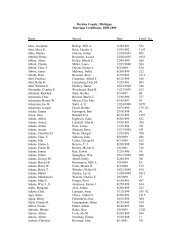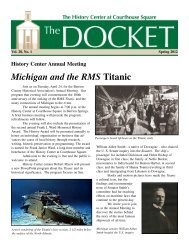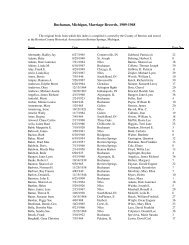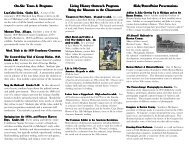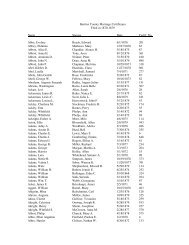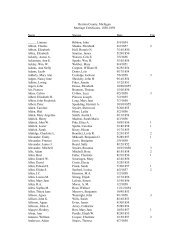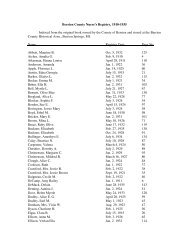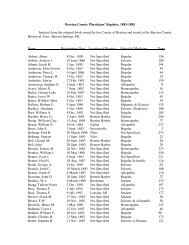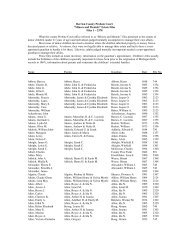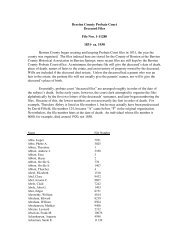Fall 2012 Docket.p65 - Berrien County Historical Association
Fall 2012 Docket.p65 - Berrien County Historical Association
Fall 2012 Docket.p65 - Berrien County Historical Association
You also want an ePaper? Increase the reach of your titles
YUMPU automatically turns print PDFs into web optimized ePapers that Google loves.
Aim at the high mark and you will hit it. No, not the first time, not the second time and<br />
maybe not the third. But keep on aiming and keep on shooting for only practice will make<br />
you perfect. Finally you’ll hit the bull’s-eye of success. ~ Annie Oakley<br />
Page 3<br />
Annie Oakley was born Phoebe Ann Mozee on August<br />
13, 1860, the daughter of Ohio Quakers. Her father died in<br />
1866 and although Annie’s mother remarried, her stepfather<br />
soon died too. Poverty forced Annie’s mother to place her and<br />
her older sister in the Darke <strong>County</strong> (Ohio) Infirmary in the<br />
spring of 1870. She was soon “bound out” to a local family to<br />
help care for their infant son, on the false promise of fifty cents<br />
a week and an education. She endured two years of near-slavery<br />
with a family that abused her mentally and physically. She<br />
returned to her own home in 1872 after her mother had married<br />
for a third time.<br />
Annie’s talent with a rifle began to develop when she<br />
was a child. She started shooting and hunting by age eight to<br />
help support her family, selling game animals to local residents<br />
as well as restaurants and hotels in southern Ohio. She managed<br />
to pay off the mortgage on her mother’s farm when she was just<br />
fifteen years old.<br />
In 1875, traveling show marksman Francis E. Butler<br />
placed a $100 bet with Cincinnati hotel owner Jack Frost that<br />
he, Butler, could beat any local fancy shooter. Frost set up a<br />
shooting match between Butler and Annie. Butler lost the<br />
match on the 25 th shot but gained a wife: he began courting<br />
Annie, and they married on August 23, 1876.<br />
Annie and Frank began performing together and joined<br />
Buffalo Bill’s Wild West Show in 1885. Their fellow performer<br />
Sitting Bull gave the diminutive five-foot tall Annie the nickname<br />
“Watanya Cicilla,” which Buffalo Bill translated as<br />
“Little Sure Shot” in his public advertisements.<br />
Annie toured Europe, where she performed for Queen<br />
Victoria, King Umberto I of Italy, Marie François Sadi Carnot of<br />
France, and other heads of state. In one exhibition, Oakley<br />
knocked the ashes off a cigarette held by the newly crowned<br />
German Kaiser Wilhelm II. After the outbreak of World War I,<br />
Oakley wrote a letter to the Kaiser requesting a second shot. The<br />
Kaiser did not reply.<br />
Ever-growing fame made Annie Oakley America’s first<br />
female superstar. In her most famous trick, she repeatedly split a<br />
playing card, edge-on, and put several more holes in it before it<br />
could touch the ground, while using a .22 caliber rifle at a range<br />
of ninety feet.<br />
Oakley pioneered the idea of women serving in combat<br />
operations for the United States Army when she wrote a letter to<br />
President William McKinley just before the Spanish-American<br />
War to offer the services of a company of fifty women sharpshooters<br />
in the event of war. McKinley turned her down, but<br />
Theodore Roosevelt named his volunteer cavalry the “Rough<br />
Riders” after the “Buffalo Bill’s Wild West and Congress of<br />
Rough Riders of the World” in which Annie was a major star.<br />
Oakley was badly injured in a railroad<br />
accident in 1901. She recovered after five spinal<br />
operations, but left the Buffalo Bill show and in 1902<br />
began a quieter acting career in a stage play written<br />
especially for her, The Western Girl. Oakley played<br />
the role of Nancy Berry and used a pistol, rifle and<br />
rope to outsmart a group of outlaws.<br />
Annie also spent her time and money promoting<br />
women’s rights and other causes. Her shooting<br />
expertise only increased with age, and in a 1922<br />
shooting contest the sixty-two year-old Oakley hit<br />
one hundred clay targets in a row at a range of 16<br />
yards.<br />
Annie died in Greenville, Ohio, at age sixtysix<br />
on November 3, 1926. A devastated Francis<br />
Butler simply stopped eating and died just eighteen<br />
days later. Representatives settling Annie’s estate<br />
discovered that she had spent her entire fortune on<br />
her family and her charities.<br />
Oakley was inducted into the National<br />
Cowgirl Museum and Hall of Fame in Fort Worth,<br />
Texas. Her remarkable life was celebrated in the<br />
1946 Herbert and Dorothy Fields musical Annie Get<br />
Your Gun.



